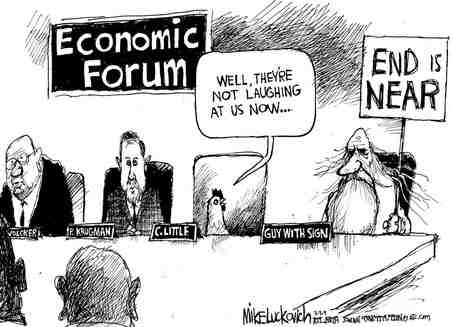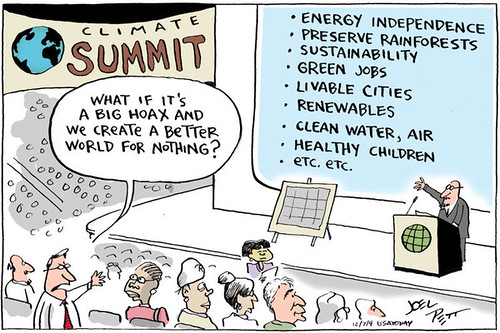Excerpt: "Ornstein (conservative resident scholar at the American Enterprise Institute) and Mann (liberal fellow at the Brookings Institution) make no secret of whom they blame for most of the dysfunction in Congress. "One of the two major parties, the Republican Party, has become an insurgent outlier – ideologically extreme; contemptuous of the inherited social and economic policy regime; scornful of compromise; unpersuaded by conventional understanding of facts, evidence, and science; and dismissive of the legitimacy of its political opposition."
***
(More cartoons after "the story")
***
***
(More cartoons after "the story")
***
Extremism In Congress: "It's Even Worse Than It Looks"
Congressional scholars Thomas Mann and Norman Ornstein are no strangers to D.C. politics. The two of them have been in Washington for more than 40 years — and they're renowned for their carefully nonpartisan positions.
But now, they say, Congress is more dysfunctional than it has been since the Civil War, and they aren't hesitating to point a finger at who they think is to blame.
"One of the two major parties, the Republican Party, has become an insurgent outlier — ideologically extreme; contemptuous of the inherited social and economic policy regime; scornful of compromise; unpersuaded by conventional understanding of facts, evidence and science; and dismissive of the legitimacy of its political opposition," they write in their new book, It's Even Worse Than It Looks.
Mann, a senior fellow at the Brookings Institution, and Ornstein, a resident scholar at the American Enterprise Institute, join Morning Edition host Steve Inskeep to talk about the book, which comes out this week.
Mann and Ornstein posit that democracy in America is being endangered by extreme politics. From the first day of the Obama administration, Ornstein says, our constitutional system hasn't been allowed to work.
"When we did get action, half the political process viewed it as illegitimate, tried to undermine its implementation and moved to repeal it," Ornstein says.
The authors make no secret of whom they blame for most of the dysfunction in Congress — the Republican Party. And Ornstein says some of his colleagues at AEI, which is known as a conservative-leaning think tank, "are going to be quite uncomfortable" with his position.
"We didn't come to this conclusion lightly," he says. He points out that he and Mann have been highly critical of both parties in previous works. For example, they called the Democrats "arrogant, condescending [and] complacent" after Democrats had been in the majority for 40 consecutive years up to 1994.
You know, maybe we are better than we were in the period leading up to the Civil War, but that left us with a virtual fracture in our society.
"But for Republicans currently inside Congress, you have a new set of litmus tests and a new outlook that leads them in directions where you can't say that there is such a thing as climate change, you take positions on things like immigration that are simply off the rails, and if you compromise, you are basically defiling what the party stands for," Ornstein says.
"We're not exactly neutral or balanced, are we?" says Mann. But a central message of their book, he says, is that norms of nonpartisanship in the media and elsewhere sometimes do "a disservice to the reality."

"It disarms the electorate in a democracy when you really need an ideological outlier to be reined in by an active, informed public," Mann says.
Mann and Ornstein recognize that many people will likely be skeptical of the argument that things in Congress today are so much worse than they used to be.
Last year, Ornstein wrote a piece for Foreign Policy magazine about the 112th Congress titled "Worst. Congress. Ever." He says a lot of people wrote to him and said, "Oh, come on, what about the period right before the Civil War?"
"And I said, 'I'll grant you that. Do you really want to be compared to the period right before the Civil War?' You know, maybe we are better than we were in the period leading up to the Civil War, but that left us with a virtual fracture in our society. We don't want to see that happen," Ornstein says.
Some might argue, however, that a politics of extremes is necessary at times. Solutions are not necessarily to be found in the middle — sometimes we may have to go to the edges to solve our problems.

"I think that's a reasonable argument," Mann says. "I don't believe in a golden mean; I don't believe you find policy wisdom between two polar points. I don't dismiss that possibility, but I look at the platform that's so ideologically based, that's so dismissive of facts, of evidence, of science, and it's frankly hard to take seriously."
Ornstein adds: "We're not against conservatives. Some of our heroes are very, very strong conservatives here. We're not against strong liberals, either. ... The problem is not one that is resolved by just turning it over to one side to do simplistic solutions that are based on more wishful thinking than reality. It's finding that hard reality."


Romney,
Mormonism and Christianity
http://paxonbothhouses.blogspot.com/2012/04/romney-mormonism-and-christianity.html






See Robert Reich on the "calamity of austerity" when enacted during hard times:

Three fine documentaries
concerning America’s economic collapse. (All of these videos are freely
viewable online):
Frontline: “Money,
Power and Wall Street”
Frontline:
“Inside the Meltdown”
2010's Oscar-winning documentary, “Inside Job”




Ayn Rand: Atheist Cornerstone of The Tea Party
http://paxonbothhouses.blogspot.com/2012/04/ayn-rand-atheist-cornerstone-of-tea.html
Pennsylvania
Billboard, 1949
Fear makes us crazy.
For
Republicans, fear resides at the heart of everything.
How do the "Good Christians" -- particularly "biblical literalists" -- interpret Yeshua's central saying? "Love your enemies. Do good to those persecute you."
Or, consider the First Epistle of John - "the apostle
Jesus loved." “There is no fear in love. But perfect love drives out fear,
because fear has to do with punishment. The one who fears is not made perfect
in love.”
1 John 4:18
The American System Is Built On Fear
"The
biggest big business in America is not steel, automobiles, or television. It is
the manufacture, refinement and distribution of anxiety.” Eric Sevareid,
American new commentator (1912-1992) http://totherow.tripod.com/index-7.html
"The
biggest big business in America is not steel, automobiles, or television. It is
the manufacture, refinement and distribution of anxiety.” Eric Sevareid,
American new commentator (1912-1992) http://totherow.tripod.com/index-7.html
"The truth is we are all caught in an economic system which is heartless."


No comments:
Post a Comment